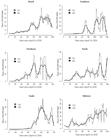Abstract
Given the rapid spread of new coronavirus within the prison system, this study’s objective was to identify spatial clusters for the occurrence of COVID-19 in the incarcerated population and analyze temporal trends of confirmed cases in the Brazilian prison system. This ecological study considered the five Brazilian macro-regions to be units of analysis, with its 26 states and the Federal District. The population was composed of all COVID-19 cases confirmed from April 14th to August 31st, 2020. The source used to collect data was the COVID-19 Monitoring Panel from the National Prison Department. Descriptive analysis, scan statistics, and time series were performed. A total of 18,767 COVID-19 cases were reported among the incarcerated population, 4,724 in São Paulo. The scan statistic analysis resulted in 14 spatial risk clusters for COVID-19 among persons deprived of liberty; the highest-risk cluster was in the Federal District. Although the country ends the series with a decreasing behavior, a growing trend was verified in most of the study period. The conclusion is that there is a need to implement mass testing among the incarcerated population while continually monitoring and recording COVID-19 cases.
Key words:
COVID-19; Prisoners; Prisons; Epidemiology

 Thumbnail
Thumbnail
 Thumbnail
Thumbnail

 Legend: (A) Time series; (B) Trend.
Legend: (A) Time series; (B) Trend.